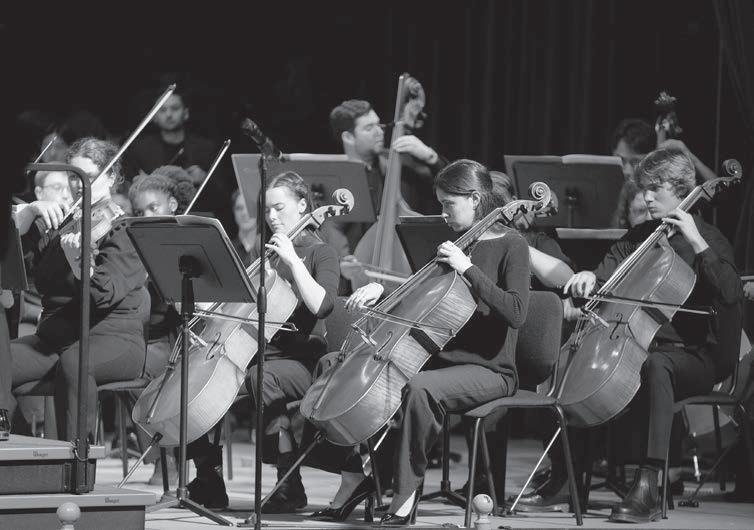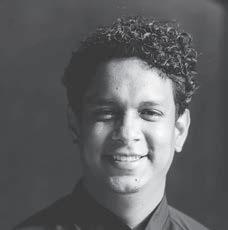

Pacific Orchestras
Sebastián Serrano-Ayala, conductor
Wednesday, October 8, 2025
7:30 pm
Faye Spanos Concert Hall
Faust Overture, op. 46 (1880)
Emilie Mayer (1812–1883)
Angélica Negrón (b. 1981)
Intermission
Symphony No. 8 in B minor, “Unfinished” (1822) Allegro moderato Andante con moto
Franz Schubert (1797–1828)
View a digital version of this program at issuu.com/MusicatPacific
PROGRAM NOTES
All program notes by Sebastián Serrano-Ayala
“Lost and Found” explores mystery, longing, and rediscovery. Emilie Mayer’s stormy Faust Overture opens the search with dramatic urgency, Angélica Negrón’s ambient Me he perdido (I Am Lost) drifts through disorientation, and Schubert’s “Unfinished” Symphony closes with haunting beauty and unresolved wonder.
Mayer: Faust Overture
Emilie Mayer (1812–1883) composed her Faust Overture in 1880, and its 1881 premiere became a late-career triumph, cementing her reputation in Berlin’s musical circles. Inspired by Goethe’s legendary tale of a scholar’s pact with the devil, the music vividly conveys Faust’s turbulent emotional journey. It begins in darkness and mystery, then surges with a stormy urgency in the main section, punctuated by contrasting “glimpses of heaven” in the woodwinds’ chorale-like passages. Ultimately the overture drives toward a triumphant conclusion, as if hinting at hard-won redemption.
Mayer was hailed in her time as the “female Beethoven” for her mastery of large-scale forms. One of the most prolific Romantic composers of her time, she wrote eight symphonies and numerous overtures at a time when female composers were often overlooked. The Faust Overture, one of her finest works, showcases Mayer’s bold orchestration and dramatic sense of contrast. Sweeping melodies and restless harmonies depict the mystery and longing at the heart of Faust’s story, his relentless quest for fulfillment and the chaos that ensues. Tonight, this impassioned overture opens our program’s journey of “lost and found,” setting a searching, dramatic tone for what follows.
Negrón: Me he perdido
Contemporary composer Angélica Negrón (b. 1981) invites us into a very different sound world with Me he perdido, a title that translates to “I am lost.” Born and raised in Puerto Rico and now based in New York, Negrón is known for blending classical instruments with electronics and unusual found sounds to create vividly ambient textures.
Written in 2015 and commissioned by the American Composers Orchestra, the piece grew out of a period of writer’s block. Rather than resisting that feeling, Negrón embraced it, deciding to write music about the uncertainty of not knowing where one is headed. Inspired by a verse from the Argentine poet Oliverio Girondo, Me he perdido celebrates the mystery of the creative
process itself, wandering without a clear destination, allowing the music to reveal its own path.
Adding a personal touch, Negrón incorporates sounds recorded from her own kitchen, pots and pans sampled and processed electronically. In performance, these familiar timbres are triggered live from a MIDI keyboard and interwoven with orchestral colors and mechanical percussion, creating an immersive and atmospheric soundscape.
The music explores feelings of disorientation and vulnerability, the emotional state of being lost. Delicate textures shimmer, drift, and dissolve, often without a clear sense of direction, beautifully capturing the sensation of wandering through a dreamlike haze. You may also hear traces of Negrón’s background in ambient electro-pop: gentle pulses, ethereal chords, and distant melodic fragments that emerge and vanish.
Though brief, Me he perdido serves as the contemplative heart of tonight’s program. Its ambient drift creates a meditative space between the Romantic dramas of Mayer and Schubert, inviting us to reflect on our own journeys through uncertainty and to discover beauty in the unknown.
Schubert: Symphony No. 8 in B minor, “Unfinished”
The concert concludes with a beloved masterpiece of mystery: Franz Schubert’s Symphony No. 8 in B minor, famously known as the “Unfinished.” Schubert (1797–1828) began this symphony in 1822, but for reasons still debated by music historians, he never completed it beyond two movements. Those two movements, an Allegro moderato and an Andante con moto, were lost to the world for over 40 years, until long after Schubert’s death. In 1865, the manuscript resurfaced in the hands of a friend to whom Schubert had entrusted it, and the “Unfinished” symphony finally had its premiere, astonishing audiences with its emotional depth. Ever since, this work has invited listeners to savor its haunting beauty and to wonder what might have been if Schubert had finished the journey.
Despite its incomplete form, Schubert’s “Unfinished” feels spiritually profound and complete in its own way. The first movement opens in a shadowy whisper, low strings and hushed basses introduce a theme that emerges from silence like a question in the dark. This movement moves between two emotional worlds: the brooding mystery of the minor-key opening and a warmly lyrical second theme that rises like a beam of light. Surging string tremolos and the dark, noble sound of trombones lend a
PROGRAM NOTES
dramatic weight rare in Schubert’s earlier works. The second movement shifts to a radiant E major, singing with tenderness and serenity. Its gentle melodies and sighing figures seem to offer comfort, yet hints of the first movement’s longing still echo in the background. The symphony then ends quietly, without a finale, a poetic open ending. This unresolved close leaves us in a state of unanswered wonder and raises the question: is it truly unfinished, or somehow complete in its two movements? Schubert’s “Unfinished” symphony invites us to embrace the beauty of the unknown. In the context of “Lost and Found,” it is both a lost work rediscovered and a musical journey that finds peace in unanswered questions.

To view our upcoming events, scan the QR code or visit Pacific.edu/MusicEvents
Sebastián Serrano-Ayala is an assistant professor of practice in orchestral conducting at University of the Pacific.
Recognized for his inclusive leadership, international reach, and innovative, fresh programming, Colombian-born conductor Serrano-Ayala has led professional and student orchestras across the U.S., Latin America, the Philippines, and the Netherlands, blending cultural perspective with artistic excellence.

Serrano-Ayala is an active conductor and guest artist, with recent engagements including the Saratoga Orchestra and Skagit Symphony, and fellowships with Symphony Tacoma, Cabrillo Festival, the National Orchestral Institute, the Allentown Symphony, and the Mostly Modern Festival. He has premiered and recorded new works with the American Modern Ensemble in New York and served as cover conductor for the Seattle Youth Symphony and Yakima Symphony Orchestra.
At the University of New Mexico, he served as director of orchestral studies, conducting the UNM Symphony Orchestra and Sinfonia, teaching graduatelevel conducting, and facilitating guest residencies with Michael Sanderling, Colonel Jim Keene, Sérgio Azevedo, and others. He frequently collaborates with regional honor ensembles and educational programs across Washington and New Mexico.
Serrano-Ayala holds a DMA from CCM and has trained with Marin Alsop, Mei-Ann Chen, and JoAnn Falletta. His competition honors include finalist distinctions from The American Prize and the Denver Philharmonic, and a semi-finalist award at the World Music Contest.
PACIFIC ORCHESTRAS
The Pacific Orchestras perform an inclusive range of contemporary and historically significant works. The ensemble provides performers with a variety of sizes and settings to explore an exciting range of repertoire. Pacific faculty, students, and guest artists perform with the ensemble as concerto and aria soloists and as guest conductors. Participation in the ensemble is open to all Pacific students by audition.
Violins 1
Lizzie Mendoza, concertmaster
Carissa Lee
Alizon Lopez
Erick Sariles
Alyssa Yen
Violins 2
Izzy Knittle, principal
Julianna Ramirez
Yaretzi Castro Rios
Rafael Marinas
Violas
Yihan Yoon, principal
Angela Arroyo
Matilda Hofman††
Tom Pham
Cellos
Nicholas Trobaugh, principal
Tyler Chang
Megan Chartier**
Hope Lee
Jiangshuo Ma
Benedict Ventura
Double Basses
Elijah Atchley, principal
Victor Camacho
Emiko Hernandez
Miguel Velarde
Flutes
Riko Hirata*
Henrie Notley
Jasmine Valentine
Ethan Williams†‡
Oboes
Walker Austin*
Gabriel Jarata
Jayden Laumeister†
Emily Zamudio‡
Clarinets
Edmund Bascon†
Audrey Ewing‡
Tommy Galvin*
Bassoons
Casey Mercado
Justin Silva‡
Enrique Valdez*†
Jess Vreeland
Horns
Ciera Alkhoury*
Marcelo Contreras
Don Parker‡
Lily Walter†
Trumpets
Yukina Shimokawa, principal
Amalia Silva
Trombones
Radley Rutledge, principal
Miguel Palma
Matt Young, bass
Tuba
Seth Morris
Keyboard
Michelle Han
Percussion
Casey Kim
Robert McCarl
Harp
Jacquelyn Venter‡‡
*principal, Mayer †principal, Negrón ‡principal, Schubert **faculty member ††assisting musician ‡‡ community member
Faculty Coaches
Ann Miller, violin, viola
Megan Chartier, cello
Kathryn Schulmeister, double bass
Brittany Trotter, flute
Kyle Bruckmann, oboe, English horn
Patricia Shands, clarinet
Nicolasa Kuster, bassoon
Sadie Glass, horn
Alia Kuhnert, trumpet
Bruce Chrisp, trombone, euphonium
Jonathan Seiberlich, tuba
Natsuki Fukasawa, piano
Jonathan Latta, percussion
Jonathan Latta, ensembles program director
Breanna Daley, ensemble librarian
SUPPORT OUR STUDENTS AND PROGRAMS
Every gift to the Conservatory from an alum, parent, or friend makes an impact on our students. Our students rely on your generosity to enable them to experience a superior education.
Please contact the Assistant Dean for Development at 209.932.2978 to make a gift today. You may also send a check payable to University of the Pacific:
Conservatory of Music, University of the Pacific
Attn: Assistant Dean for Development
3601 Pacific Avenue
Stockton, CA 95211
